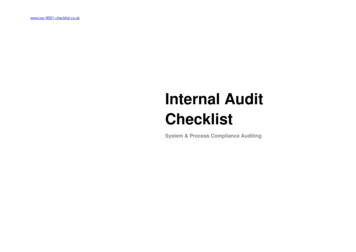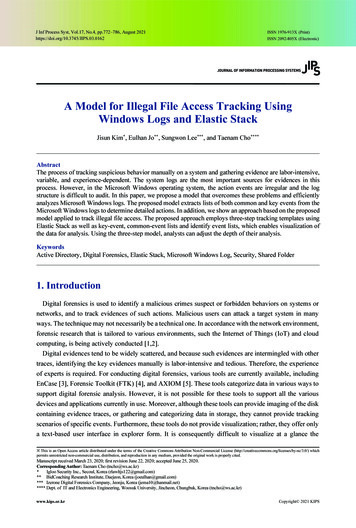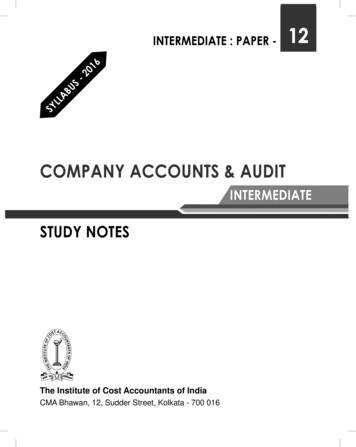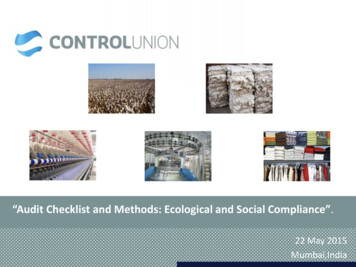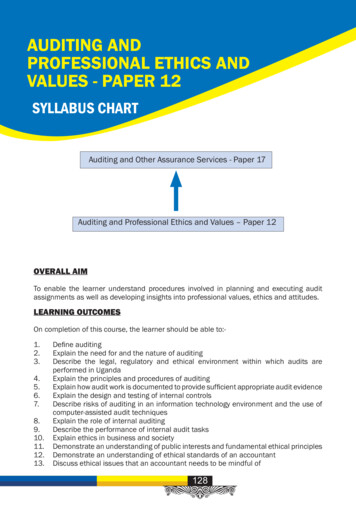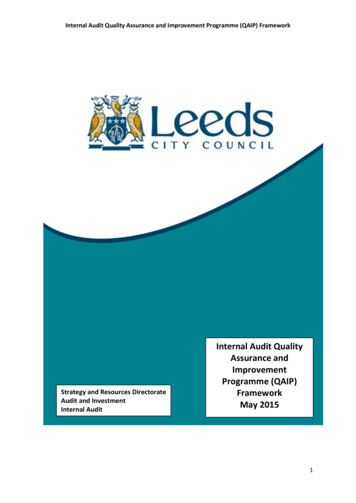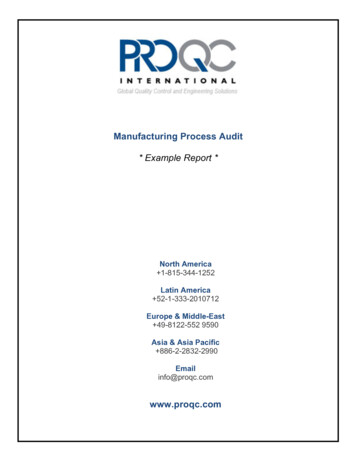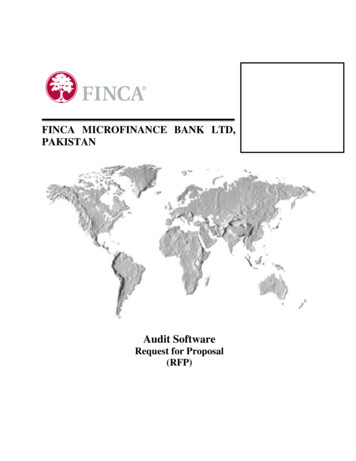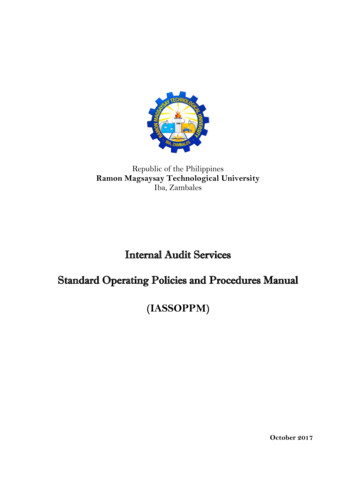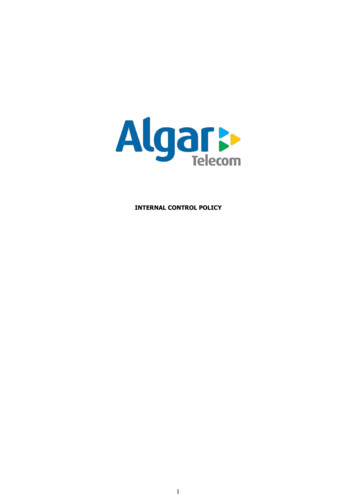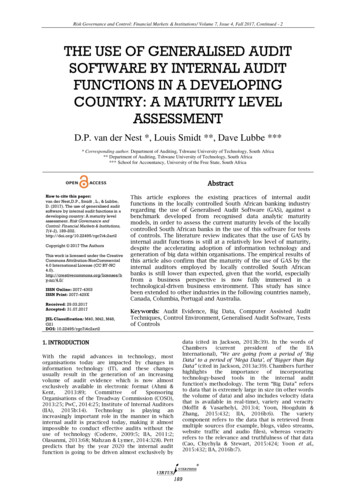
Transcription
Ethiopian Institute of Financial Studies (EIFS)RISK BASED INTERNAL AUDITCOURSE OBJECTIVEThe objective of this course is to clarify the principles of Internal Auditalong with the Audit process and arm internal auditors with a goodknowledge of risk based audit.CONTENT: Concepts and principles of Internal Audit Pre-field auditSelection of AuditeeAudit Planning Field auditReview of auditee operationsInternal control analysis and appraisalAudit procedure and testingDevelopment of findings and recommendations The audit reportFollow up on audit findings OthersAudit work papersObjective and scope of an internal audit departmentQuality control & assuranceInternal auditors code of conductTARGET GROUP Internal auditors are eligible for this course.DURATION: 10 half daysMETHOD OF INSTRUCTIONS Lecture with practical exercise Internal auditors are eligible for thiscourse. 0115-175063/0115-175297/0115-175346Address: National Bank of EthiopiaAddis Ababa1
Ethiopian Institute of Financial Studies (EIFS)BANK RISK MANAGEMENTOVERALL DESCRIPTIONFinancial institutions play a crucial role in an economy. On one hand, they arehighly depending on public confidence and on the other hand, they are highlyexposed to a number of risks. Risk issues arise in every credit decision. A prudentbanker balances this risk against the potential for reward to ensure the maximumreturn for the bank. There is also the requirement to meet the customers' needs,retain existing business and attract new clients. Inadequate attention andinappropriate ways to risk management would diminish reputation and trust. Thus,appropriate and effective risk management is inevitable. Thanks to the BaselCommittee, the process of harmonizing theses regulations internationally is at anadvanced stage. The objective of the Basel Committee is to maximize the level ofstandardization of banking supervision world-wide and achieve the qualitydemanded of banks and their supervisory bodies. New decisive guidelines issuedby the Basel Committee for the credit industry include among others the Principlesfor Credit Risk Management and Basel II.COURSE OBJECTIVESThe growing sophistication of the Ethiopian Financial Sector and its increasinginterconnection with the global market place has meant that it is beginning to beexposed to increasingly complex and intertwined risks. This course aims to putbanks and their representatives at the forefront of risk identification, measurementand management. Upon completion of this course, participants should be able to: Identify inherent risks in lending; Minimize that risk; understand various mechanisms for assessing reward;and Maximize that reward.CONTENT New trends in risk management on the international financial marketFinancial risks vs. non-financial risksCredit risk managementLiquidity risk management: modern tools to manage the bank’s liquidityInternational best practices in CRM: Basel IIMarket risk management: Interest rate risk managementDifferent models and tools in modern market risk managementFOREX risk managementFOREX instruments: SWAPS; options, futuresTARGET GROUP Credit and corporate banking staff;Corporate strategy & planning personnel;Financial control as well as internal control and compliance staff;Middle and senior level officers working in investment, treasury, accounts; andOther planning related departments staff at head office.DURATION 11 half days 0115-175063/0115-175297/0115-175346Address: National Bank of EthiopiaAddis Ababa2
Ethiopian Institute of Financial Studies (EIFS)MARKETING AND CUSTOMERRELATIONSHIP MANAGEMENTOVERALL DESCRIPTIONThe seminar will allow participants to obtain a better understanding of the principles of marketing,how to apply them and the different aspects of strategic and operational marketing. It will assistthem to better understand how to combine various marketing instruments and their effects. Theparticipants will learn how to bring together information from internal and external sources todetermine needed products and services, what price will be acceptable to clients, how can theseproducts and services be sold in the most efficient and effective manner and which informationchannel is the best to reach clients. From a discussion of what customers are buying from theirfinancial service providers (banks) we will develop a relationship building process based on theunderstanding of strategically important customer knowledge, how to have access to privilegedconfidential information and use it to build unique structured value added business propositions.COURSE OBJECTIVESThe course has the following key learning objectives: Distinguish between marketing, sales and market goals and explain them.Explain and use correctly market research and its instruments.Use and differentiate the Instruments of the marketing mix and sales promotion.Understand the basics of personnel marketing in the sense of organizational Integration.CONTENT What marketing really isDevelop marketing strategyMarketing researchCompetitor analysisCustomer research techniquesMarketing of financial servicesCorporate identity and brand valuesDevelop a marketing planDevelop product & pricing strategiesProduct development and bundlingProduct pricingAdvertising, communications & publicityOrganizing a successful campaignSetting marketing budgetsMeasuring the return on your investmentCRM key elements and critical success factorsUnderstanding your internal and external customer relationshipsCustomer service standardsCustomer retentionCommunication & listening skillsKnow your customers (KYC)Understand the customer buying processCustomer financial and business needs analysisCustomer acquisition planningUnderstanding the four core traits of successful salespeopleNegotiating and closing the saleThe sales model – customer needs focusedSales model role play with collective and individual feedbackCross-selling matrixTARGET GROUPThis program is ideal for participants involved in product development; marketing communications,research and implementation. Also for those involved in a consultative customer relationship andsales role and who rely on other business units for the delivery of the product or service to thecustomer.DURATION 10 half days 0115-175063/0115-175297/0115-175346Address: National Bank of EthiopiaAddis Ababa3
Ethiopian Institute of Financial Studies (EIFS)CHANGE MANAGEMENTOVERALL DESCRIPTIONToday, Change Management is the most important topic in the organizationaleffectiveness and the most critical and challenging responsibilities of organizationalleadership.These responsibilities have become even more important in the financial sector inEthiopia. The financial sector is dynamic and for the foreseeable future will undergoradical changes. It is faced with significant and complex challenges, both incommercial and regulatory terms. Dynamic environments such as these requiredynamic processes, people, systems and culture in order to respond to marketopportunities and threats and to manage change successfully.In this context, the course focuses on the organization wide-change managementprinciples and modern techniques to enhance the ability of management in theEthiopian financial institutions to cope with the challenges confronting them in orderto face the fast-changing competitive business environment and global economychallenges.Successful change management techniques will help organizations to: Reduce turnover and the loss of valued employee Accelerate the implementation of the change Reduce productivity loss and employee resistanceTARGET GROUP Top and middle managers of Ethiopian financial institutionsCOURSE OBJECTIVESAfter this course, the course participants will be able: To understand fundamentals and principles of Change ManagementTo be able to prepare the change process and to prepare people for ChangeTo manage the Change process successfullyTo reinforce ChangeCONTENT Definition of the change processWhat is a successful change?Why change MANAGEMENT?Fundamentals and principles of the Change Management processDifferent types of organizationsWhat to change: Structure, technology, culture & peoplePreparation of the change managementSuccess principles in the change managementLeadership skills managementManagement of the change processCommunication in the change processReinforcement of the changeDURATION 4 half days 0115-175063/0115-175297/0115-175346Address: National Bank of EthiopiaAddis Ababa4
Ethiopian Institute of Financial Studies (EIFS)COMMUNICATIONAL SKILLSOVERALL DESCRIPTIONIn today’s business communicational skills are as important as technicalknowledge.There will be no successful career without having good communicational skills.In this course the participants will learn how to communicate successfully withtheir clients. The participants will learn modern techniques of managing aconversation. This training includes influencing, negotiation, dealing with conflictand difficult people.COURSE OBJECTIVESThe course has the following key learning objectives: Understanding Communication Dynamics Developing Listening and Responding Skills Developing negotiating skillsCONTENT What is a communicational process? Sending and receiving a message Understanding needs of a client Phases of a conversation: introduction, sending a message andsummarizing Listening techniques Questioning techniques: paraphrasing, summarizing, closed and openquestions Verbal and non-verbal communication Negotiating skills Cross-selling technique: a modern selling technique Modern features of a phone conversation A closure of a conversationTARGET GROUP Front-office employeesDURATION 4 half days 0115-175063/0115-175297/0115-175346Address: National Bank of EthiopiaAddis Ababa5
Ethiopian Institute of Financial Studies (EIFS)LEADERSHIP SKILLSOVERALL DESCRIPTIONLeadership is becoming a more and more important quality in today’s quicklychanging business environments. The challenges for modern leaders are growingand to become a good leader certain qualities are necessary. It is often said thatleadership is a quality that people have to be born with but this training will showthat leadership skills can be learned and need to be practiced. Thus, the goal of thistraining is to activate the leadership potential of the participants, so that they are notonly managers anymore but also good leaders. Therefore, we provide theparticipants with theory about characteristics of good leadership first. We find outwith the trainees what kind of leaders they are and how they can develop theirpersonal leadership skills. The participants learn to use leadership tools andmethods to motivate their employees and teams to achieve great results in thefuture.COURSE OBJECTIVESAfter this course, the course participants will be able to: Differentiate between leadership and managementKnow to apply the techniques and tools for successful leadershipLead their employees to reach great results.CONTENT Definition of leadershipThe difference between leadership and managementDifferent types of leadersLeadership theoriesLeadership models and stylesPrinciples of good leadership behaviourEssential skills to become a good leaderCommunication and FeedbackTARGET GROUP Top and Middle Managers of the Ethiopian Financial InstitutionsEthical leadershipLeadership and changeLeadership and change managementDURATION 4 half days 0115-175063/0115-175297/0115-175346Address: National Bank of EthiopiaAddis Ababa6
Ethiopian Institute of Financial Studies (EIFS)FINANCIAL MANAGEMENTCOURSE OBJECTIVESTo familiarize participants how to raise funds, invest, manageresources wisely and finally create awareness to adopt to change.CONTENT The scope and environment of financial decisionsWorking capital managementInvestment and financing decisionsTARGET GROUP Managers and officers, directors in Accounting and processingdepartment.DURATION 10 half daysMETHOD OF INSTRUCTIONS Class room trainingClass discussions and exercises 0115-175063/0115-175297/0115-175346Address: National Bank of EthiopiaAddis Ababa7
Ethiopian Institute of Financial Studies (EIFS)HUMAN RESOURCE MANAGEMENTCOURSE OBJECTIVESThe objective of this course is to provide participants with modernconcepts and practices of human resources management and tohelp them acquire the knowledge and skills which will enable themto play a key role in the major functions of human resourcesmanagement within the organization.CONTENT Definition, Role and Importance of HRMEvolution of personnel Management into HRM and Strategic HumanResource Management (Theory Application)Human Resource planning (HRP)Recruitment and selectionPerformance planning and management system (PPMS)performance planning and Review system (PPRS)Training and developmentJob analysis and job evolutionCompensation administrationLabour management relationsDisciplineTARGET GROUP Division and District Managers and DirectorsDURATION 10 half daysMETHOD OF INSTRUCTIONS Lecture with practical exerciseCases and exercises 0115-175063/0115-175297/0115-175346Address: National Bank of EthiopiaAddis Ababa8
Ethiopian Institute of Financial Studies (EIFS)STRATEGIC MANAGEMENTOVERALL DESCRIPTIONResearch has shown a direct correlation between excellence in strategy development and superior operatingperformance. In today's evolving and increasingly competitive financial-services sector, an institution that does notutilize an effective strategic planning process can at best cope with change but will find it impossible to proactivelymanage change. Ineffective planning means leaving the organization at the mercy of external factors.This four-day program is viewed as the cornerstone of management development for the financial servicesindustry, and it is designed to provide participants with an understanding of the strategic and tactical decisionmaking processes facing senior managers and executives. In today's competitive environment the future of aninstitution depends on managers who can knowledgeably evaluate information and make informed decisions inaccordance with their organizations strategic objectives. This requires a sound, cross-functional understanding ofthe institutions business.COURSE OBJECTIVESThe objective of this course is to introduce participants to the main concepts and instruments of strategy, and aconceptual framework and tools which will enable them to develop innovative and competitive strategies that areapplicable by financial institutions managers.Upon successful completion of the program the participant will be equipped to: Understand the importance of strategic management and its applicability.Make informed strategic decisions designed to advance the objectives of the entire enterprise rather thannarrow, functionally-based decisions.Demonstrate an understanding of the primary financial and performance measurement concepts thatdrive and constrain the industry.Interpret key financial, economic and market data that can affect the success of the institution's strategy.Understand competition in products, pricing and performance which can impact the organization'scompetitive position.Have an integrated and coherent view of all the components of the strategic management process.CONTENT The analytical framework of business strategy Organizational analysis The analytical framework of industry analysis The analytical framework of market analysis How to set up and manage an economic activityTARGET GROUPThis training is aimed at: Senior functionaries from banks and financial services companies – Heads of Departments, BranchManagers, General Managers – who are involved in strategy formulation, product policy and planning andnew business initiatives.DURATION 8 half days 0115-175063/0115-175297/0115-175346Address: National Bank of EthiopiaAddis Ababa9
Ethiopian Institute of Financial Studies (EIFS)MANAGEMENT INFORMATION SYSTEMOVERALL DESCRIPTIONMIS involves the study of how organizations use Information and Information Technology to overcomeproblems or create opportunities.This Training deals with the nature of Information as an organizational resource; its significance in decisionmaking and management for the digital firm; Information requirements at different levels and functional areasof management; identification and source of Information required; management of Information Systems,hardware and software resources; development of Information System for the digital firm; introducing ebusiness and e-commerce and familiarizing with the Internet; application of information and knowledgemanagement.COURSE OBJECTIVESAt the end of this training the trainee will be able to: Describe a Management Information System (MIS) and clearly explain its role in an organization Distinguish the difference among Information System types Recognize and differentiate the relationship between information “the fourth factor of production” anddecision making Understand the significance and impact of information and Information Systems as basic resourcefrom managerial perspective in decision making Identify ability and skills those help to identify information needs, source and to utilize the informationefficiently and effectively Explain the main principles and concepts of designing and implementing Information SystemsCONTENT Information technology and information systems Management information system: An introduction Management information system and decision making Information systems in management Computer based information system Transaction processing systems Tactical and strategic information management Data as organizational resource Need for system control security and ethicsTARGET GROUP Middle level supervisors and senior mangersDURATION 10 half days 0115-175063/0115-175297/0115-175346Address: National Bank of EthiopiaAddis Ababa10
Ethiopian Institute of Financial Studies (EIFS)CORPORATE GOVERNANCEOVERALL DESCRIPTIONCorporate governance has re-emerged as one of the most significant business topicsof the early twenty-first century. Governance – which we define as the structure andfunction of a corporation in relation to its stakeholders generally, and its shareholdersspecifically – is not, of course, new. It has been widely discussed, debated, andanalyzed for many decades. Public focus is strong because governance failures cannow impact a very large number of stakeholders: institutional and retail shareholders(the original and primary focus of most governance initiatives), retirees andpensioners, employees, bank creditors, clients, suppliers, regulators and broadcommunities. There is heightened realization that good governance is effective inprotecting stakeholders, while poor governance puts all parties at risk.This course has been developed to assist managers of the Ethiopian financialinstitutions with the knowledge, methodological skills and practical tools for strategicand operational management of the institutions. The step by step course will assistparticipants in becoming better managers.COURSE OBJECTIVESAfter this course, the course participants will be able: To understand corporate governanceTo understand to corporate governance related issuesTo apply modern techniques and tools on corporate governanceCONTENT Definition of Corporate GovernanceWHY Corporate Governance?The main issue of Corporate Governance: the ownership issue and the management issueRisk management in Corporate GovernanceSome of the hot topics of the Board of DirectorsBusiness conductMonitoring of company’s performanceTransformational transactionsReporting to the outsideTARGET GROUP Top and middle managers of Ethiopian financial institutionsDURATION 2 full days 0115-175063/0115-175297/0115-175346Address: National Bank of EthiopiaAddis Ababa11
The objective of this course is to clarify the principles of Internal Audit along with the Audit process and arm internal auditors with a good knowledge of risk based audit. . International best practices in CRM: Basel II Market risk management: Interest rate risk management Different models and tools in modern market risk management
